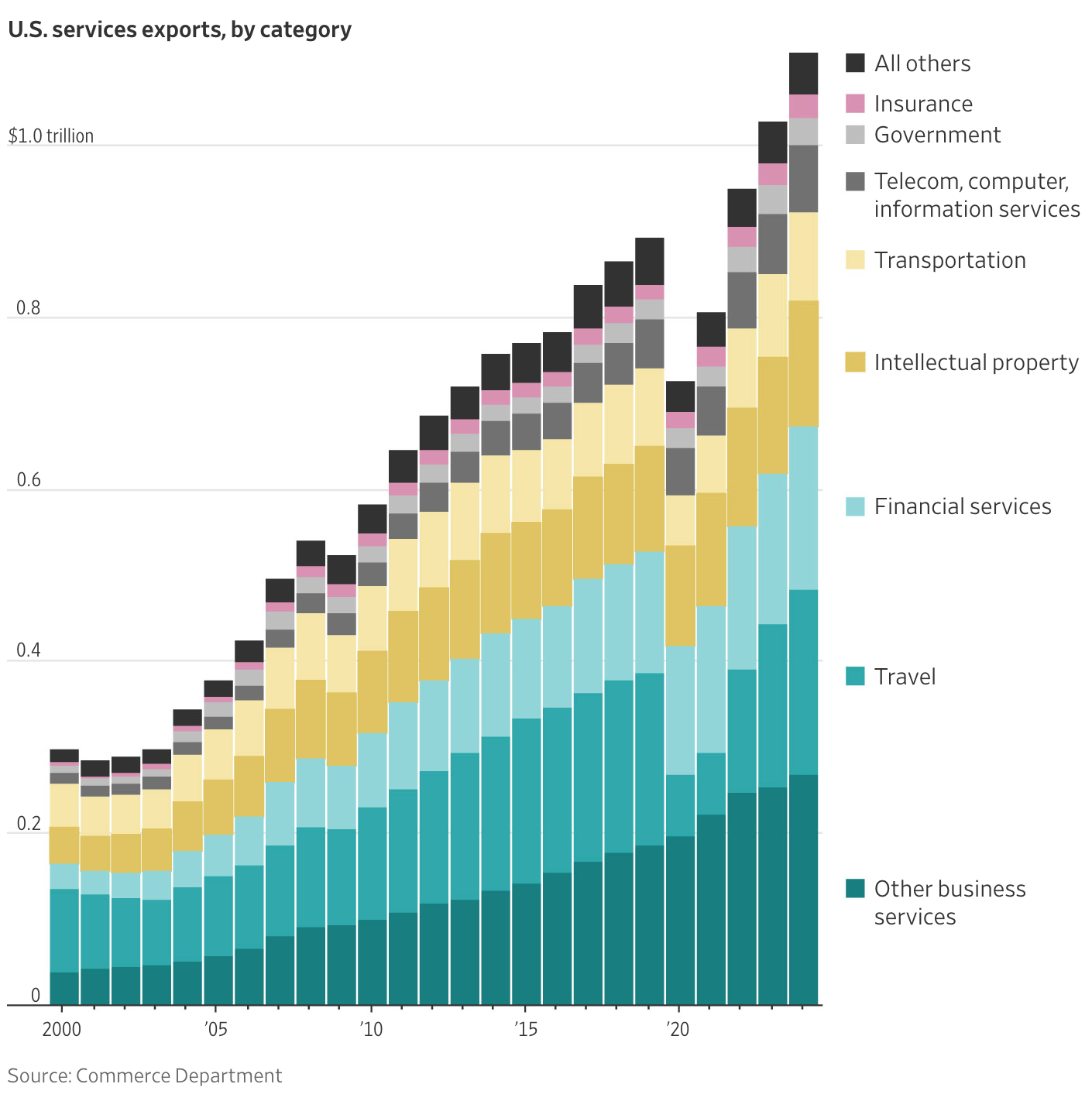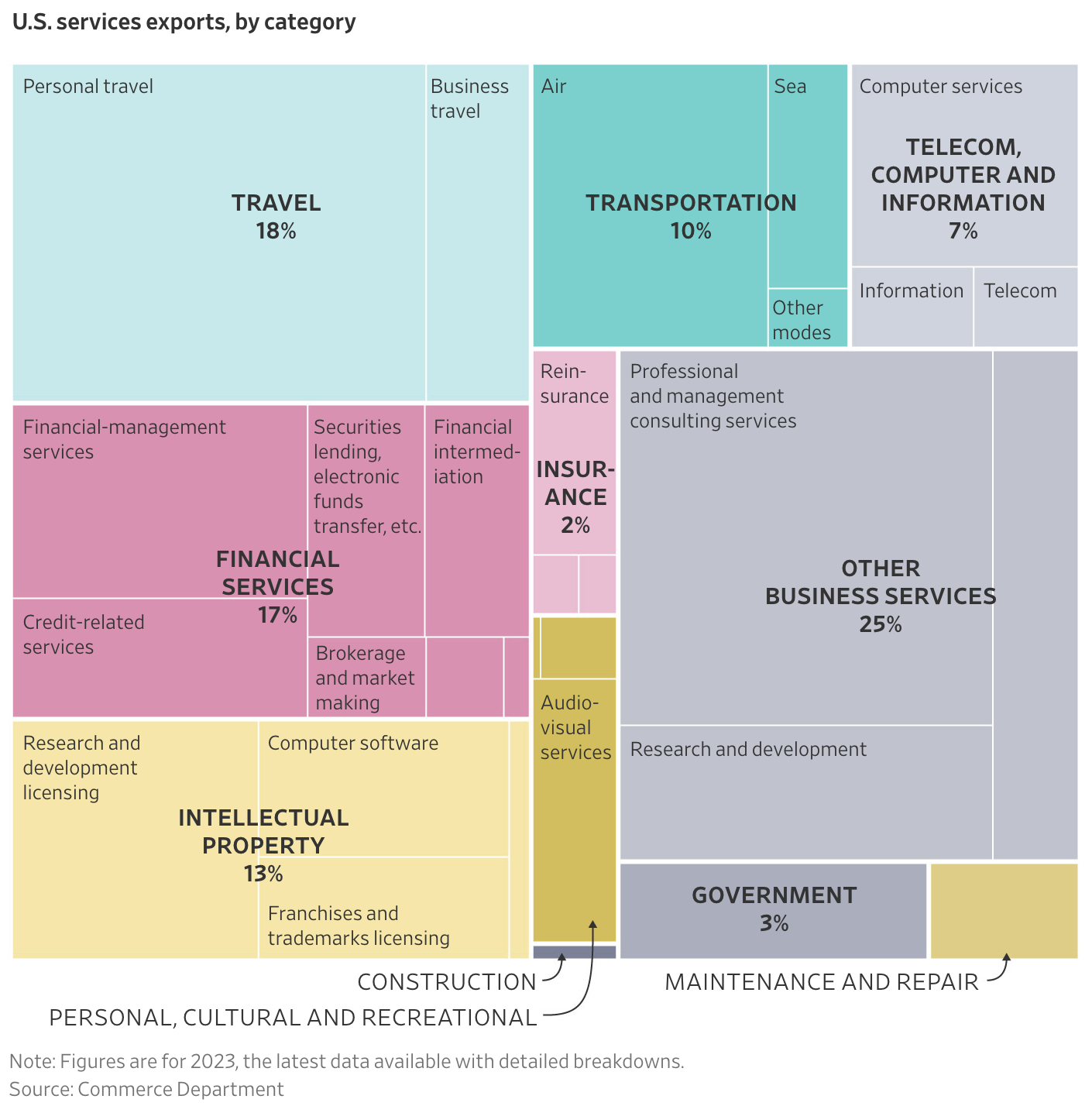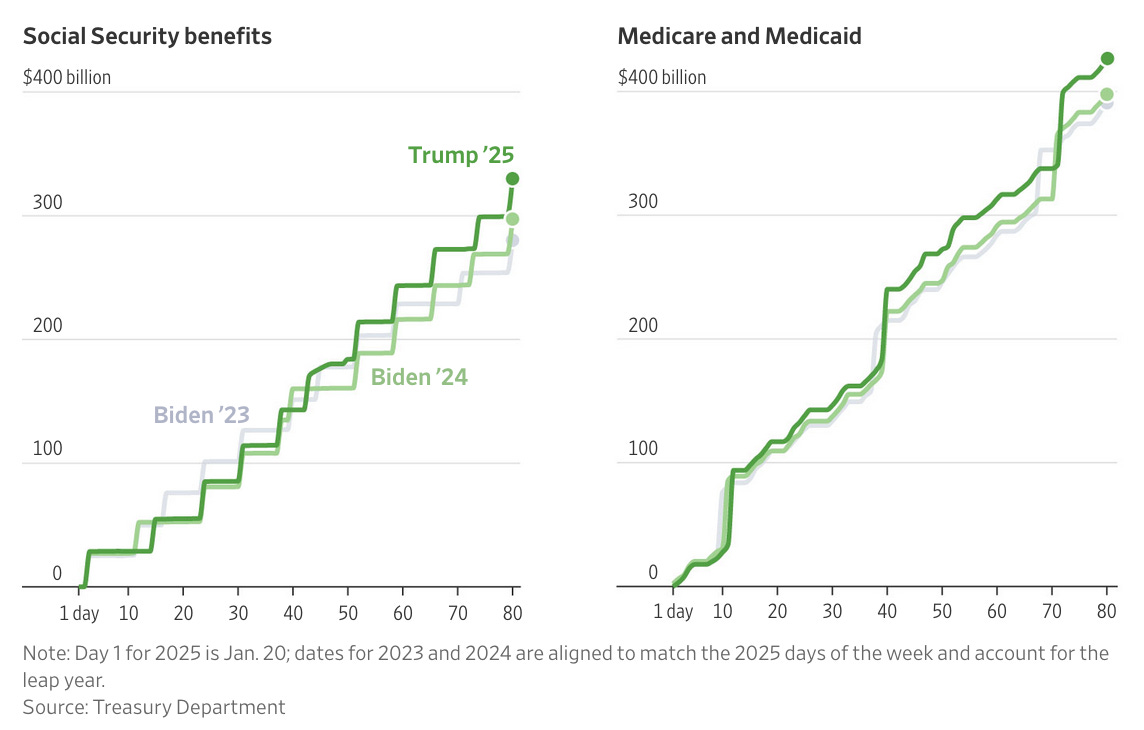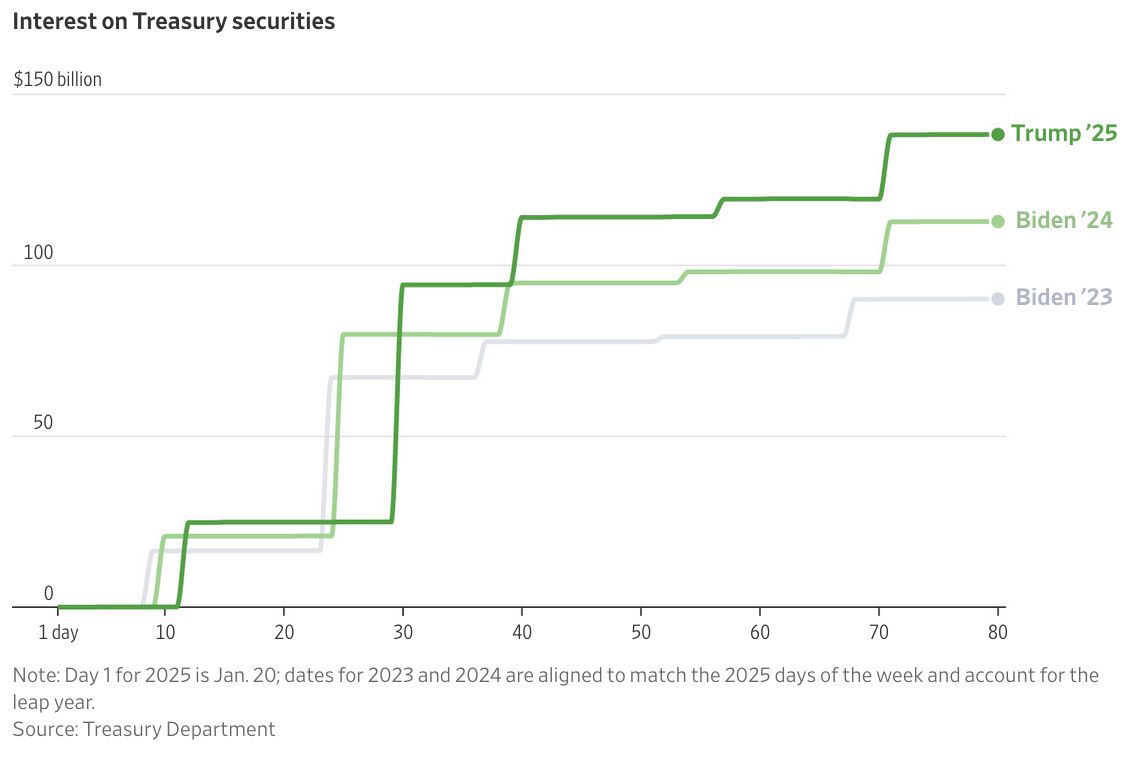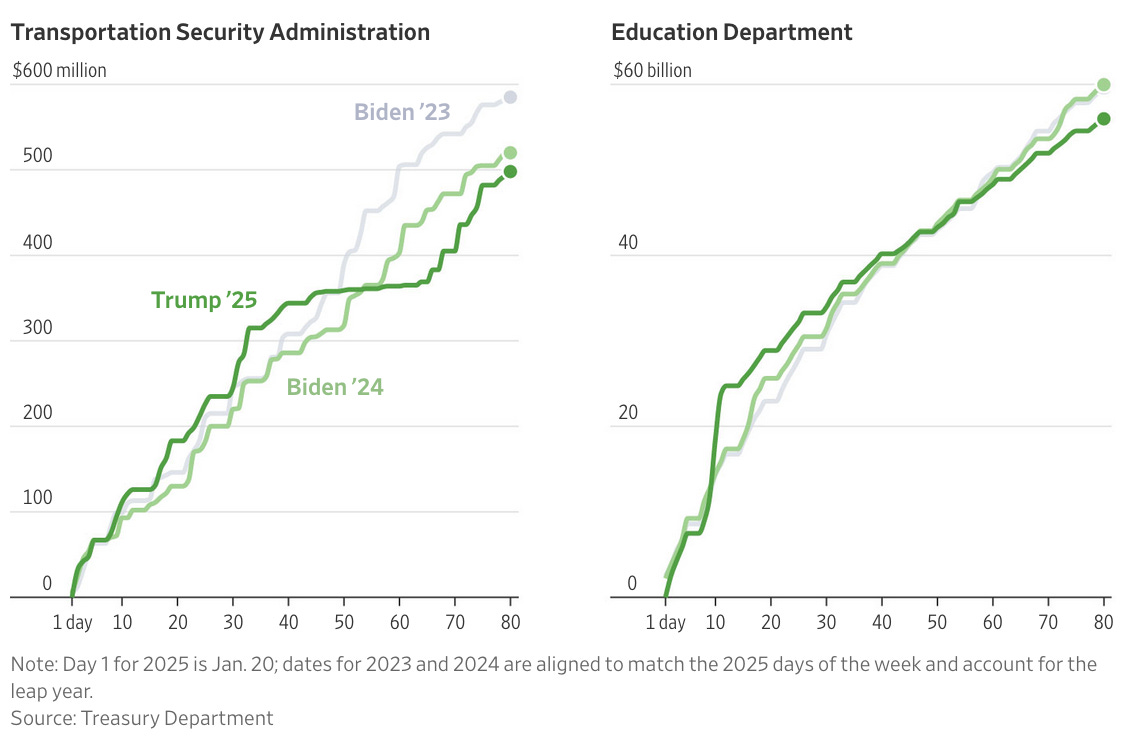👋 Hello Reader, I hope you’re doing well. Here are 12 items that stood out to me this week. I’ll state up front that I’m not smart enough to know all the intricacies of economics and trade, so I’m kind of just absorbing everything like everyone else. Some of these articles helped me see the issue(s) in different perspectives.
1. Ministerial Statement on the US tariffs and its implications by Prime Minister Lawrence Wong
NOTE: A well-articulated speech by the Singapore Prime Minister.
2. Trump’s Trade Math Ignores a Major Export: American Services
President Trump is wielding tariffs to try to close the massive U.S. trade deficit in goods, which he sees as a sign of economic weakness. It is only part of the trade story. While the U.S. buys more goods from abroad than it sells, the opposite is true for services, which include everything from streaming subscriptions to financial advice. Trump left these service exports out of his tariff math, but they are being pulled into his trade wars. On Wednesday, Trump ratcheted up the U.S. trade war with China, but put broader tariffs above 10% on most other countries on ice for 90 days. Sectoral tariffs such as the ones imposed on automobiles weren’t changed. Still, the shock of Trump’s globe-spanning tariffs has sent countries scrambling and rocked markets as world leaders adapt to a suddenly much more adversarial trade relationship with the world’s biggest economy. Countries can’t easily impose tariffs on services, but they can tax, fine or even ban U.S. companies. The European Union has floated going after big U.S. tech companies in response to Trump’s sweeping tariff threats. Trump also put U.S. service exports at risk by irking foreign consumers, many of whom might choose to avoid U.S. banks, asset managers and other firms. An economic slowdown that curbs demand as markets grapple with the president’s extreme trade makeover won’t help either.
3. US consumer sentiment plummets to second-lowest level on records going back to 1952
Consumer sentiment plunged 11% this month to a preliminary reading of 50.8, the University of Michigan said in its latest survey released Friday, the second-lowest reading on records going back to 1952. April’s reading was lower than anything seen during the Great Recession.
4. See How Government Spending Is Up Even as Musk Touts Savings
Federal spending is higher since President Trump took office even as the Department of Government Efficiency slashes contracts, cuts jobs and ends diversity programs. A Wall Street Journal analysis of daily financial statements issued by the Treasury Department found government spending since the inauguration is $154 billion more than in the same period in 2024 during the administration of former President Joe Biden. DOGE claims cuts of $150 billion so far, but the Journal analysis found those efforts have yet to affect the bottom line. And while the government’s income—taxes and revenues including tariffs—is also up, it isn’t enough to keep pace with higher spending.
NOTE: I think this article highlights just how much our government spends (that we’re not even focusing on, yet). Be sure to note the difference between Trillion, Billion, and Million in the charts below.
5. Off-the-charts stock market volatility is a sign we’re living financial history
Monday saw a swing from a low of -4.7% to up as much as 3.4%, Tuesday from a high of 4.1% to down 3%, and Wednesday’s 10% daily peak came after a 0.7% intraday decline. Those sessions all rank in the 35 biggest daily ranges for the S&P 500 based on data from Bloomberg going back to 1982, with Wednesday cracking the top five. To track the range, we measured the distance between the day’s high and low relative to the previous session’s closing price, in percentage points.
6. How Long Could You Survive in a Bank Vault? Where Crime Writers Go for Answers.
Mystery writers have questions. These former crime fighters have answers. A Facebook group started by a retired Milwaukee police sergeant has become a valued resource for scribes hoping to avoid amateurish mistakes, from referencing blood splatter (it’s spatter) to featuring oversize whiteboards with Venn diagrams of the bad guys. (Most police don’t use those visuals.) Cops and Writers was created in 2019 after Patrick O’Donnell and his buddies observed one too many authorial assumptions about crime, guns and criminals that they found laugh-out-loud funny. “Some people’s life experience shines through, including the lack thereof,” said O’Donnell, who is also a crime writer. “It’s a duty to set them right.” Getting the details of the perfect crime correct can be a messy affair. How much blood results when a long-bladed kitchen knife is plunged into a woman’s chest? (It depends on the depth of the wound.) Would police in Minnesota respond to the discovery of a body in a shallow grave by blaring their sirens? (Unnecessary.)
7. How a Secretive Gambler Called ‘The Joker’ Took Down the Texas Lottery
In the spring of 2023, a London banker-turned-bookmaker reached out to a few contacts with an audacious request: Can you help me take down the Texas lottery? Bernard Marantelli had a plan in mind. He and his partners would buy nearly every possible number in a coming drawing. There were 25.8 million potential number combinations. The tickets were $1 apiece. The jackpot was heading to $95 million. If nobody else also picked the winning numbers, the profit would be nearly $60 million. Marantelli flew to the U.S. with a few trusted lieutenants. They set up shop in a defunct dentist’s office, a warehouse and two other spots in Texas. The crew worked out a way to get official ticket-printing terminals. Trucks hauled in dozens of them and reams of paper. Over three days, the machines—manned by a disparate bunch of associates and some of their children—screeched away nearly around the clock, spitting out 100 or more tickets every second. Texas politicians later likened the operation to a sweatshop. Trying to pull off the gambit required deep pockets and a knack for staying under the radar—both hallmarks of the secretive Tasmanian gambler who bankrolled the operation. Born Zeljko Ranogajec, he was nicknamed “the Joker” for his ability to pull off capers at far-flung casinos and racetracks. Adding to his mystique, he changed his name to John Wilson several decades ago. Among some associates, though, he still goes by Zeljko, or Z. Over the years, Ranogajec and his partners have won hundreds of millions of dollars by applying Wall Street-style analytics to betting opportunities around the world. Like card counters at a blackjack table, they use data and math to hunt for situations ripe for flipping the house edge in their favor. Then they throw piles of money at it, betting an estimated $10 billion annually. The Texas lottery play, one of their most ambitious operations ever, paid off spectacularly with a $57.8 million jackpot win. That, in turn, spilled their activities into public view and sparked a Texas-size uproar about whether other lotto players—and indeed the entire state—had been hoodwinked. State lottery directors say they are seeing more organized efforts to buy lottery tickets in bulk, but that the groups are largely operating legally and transparently. State lotteries like the one in Texas are in a sweet spot for the pros. The jackpots are big enough to be worth shooting for, and the number of possible combinations minimizes the risk of multiple winners. Multistate games such as the Powerball often have far bigger pots, but there are so many combinations that buying them all would be unwieldy and cost too much.
Yep, the math works out to me—spend $30M to win $90M, for a $60M profit. I’m surprised this isn’t happening far more frequently.
8. How the CIA smuggled Orwell and Le Carré into the eastern bloc
Books were smuggled on boats, trains and trucks, concealed in food tins, baby nappies and even the sheet music of travelling musicians. Over three decades before the fall of the Berlin Wall in 1989, the CIA funnelled 10m books into the eastern bloc, including George Orwell’s “1984”, John le Carré’s spy thrillers and Virginia Woolf’s writing advice. The programme was “the best-kept secret of the cold war”, writes Charlie English, an author, in a new book. George Minden, the leader of the literary-propaganda scheme, described it as “an offensive of free, honest thinking”. Censors in the eastern bloc banned books for ideological reasons or because they depicted life in the West. Rulings were draconian and absurd. Detective novels by Agatha Christie with no political message were forbidden; a book about carrots was destroyed because it described how they could grow in individuals’ gardens, not only in collectives. The state controlled printing presses. Typewriters had to be registered, and a permit was sometimes needed to buy paper. So the CIA sent printing supplies to dissidents. When Poland was under communist rule, the ink, typesetters and photocopiers sent by the agency helped sustain an underground publishing network. One Polish printer has compared this equipment to “machine guns or tanks during war”, enabling the opposition to reproduce banned books and publish their own newspapers. Adam Michnik, a former Polish dissident, told Mr English that illicit tomes saved his country: “A book was like fresh air. They allowed us to survive and not go mad.”
9. Being Alone and Feeling Lonely Are Not the Same Thing
A recent article in the Atlantic magazine (January 2025) argued that Americans are more lonely than at any time since 1965, because they spend more time alone. The reasons for this trend include the rise of the internet and social media, migration to the suburbs, and the ability to study, work, shop, and order food remotely. Certainly, media outlets are filled with stories about how much lonelier people are than in years past, and the failure to talk to people who differ from us socially, economically, or politically contributes to our inability to understand each other’s points of view. But loneliness, sociability, and mental health are slippery constructs to describe or measure. Loneliness typically refers to a negative emotion that manifests when we feel our social needs aren’t being met. As social animals, humans are uniquely dependent on their caregivers for an extended period to time to even survive. We spend a great deal of effort socializing our children so they will know how to get along with others in culturally appropriate ways. Sharing, being kind to others, and even learning to defend ourselves are behaviors designed to ensure that kids will be able to navigate the world successfully. As teenagers, we focus more of our attention on fitting into our peer group, figuring out who we are, building intimate relationships, and establishing our future life course by obtaining the education or skills we need to make a living. In the 21st century, we have access to more information and entertainment than at any other time in human history. Rather than comparing ourselves to real people, we are surrounded by influencers, celebrities, and advertisers also trying to convince us that unless we follow their advice and purchase their products, we are falling behind. Even the people we do know in real life use social media to present themselves in the best possible light. This extends to the pictures they choose to showcase and the details they do (or don’t) share about their lives, leaving all of us with the feeling that we are falling behind. Whether we are comparing our appearance to their carefully curated pictures, measuring our academic or professional progress against theirs, or feeling left out of their rewarding social circles, it is difficult not to find ourselves wanting. In the absence of data on loneliness prior to 1965, and the many social factors that influence our social expectations and perceptions, we will never know whether we really are more socially isolated than those who came before us or if we are simply coping with different circumstances. And, it doesn’t matter. The key is for each of us to take stock of our social needs and to take responsibility for rectifying the gaps that bother us. Initiating social contact, discontinuing relationships with people who aren’t supportive, and volunteering to help others can all bolster our social connections. But perhaps the most important step is to stop comparing ourselves to others, so we have the energy to create the connections we want in our lives.
10. Navy SEAL. Harvard Doctor. NASA Astronaut. Don’t Tell Mom About This Overachiever.
In half a lifetime, Jonny Kim has achieved the American dream three times over. He was a Navy SEAL. Then he graduated from Harvard Medical School. And on Tuesday, he blasted off as part of his latest act: astronaut. At astronaut graduation in Houston, Sen. Ted Cruz (R., Texas) quipped that it was ridiculous that Kim was already a Navy SEAL and a Harvard-trained doctor. “He can kill you and then bring you back to life,” Cruz said, “and do it all in space.” He blasted off on Tuesday in a Soyuz capsule, hitching a ride to the International Space Station with two Russian cosmonauts. In a recent news conference from Star City, Russia, he was asked about the biggest challenge of his mission. Kim referred to the months he spent acquiring one more skill, because his journey to space wasn’t conducted in English. “The hardest part was certainly learning Russian,” he said.
11. Scientists Revive the Dire Wolf, or Something Close
For more than a decade, scientists have chased the idea of reviving extinct species, a process sometimes called de-extinction. Now, a company called Colossal Biosciences appears to have done it, or something close, with the dire wolf, a giant, extinct species made famous by the television series “Game of Thrones.” In 2021, a separate team of scientists managed to retrieve DNA from the fossils of dire wolves, which went extinct about 13,000 years ago. With the discovery of additional DNA, the Colossal researchers have now edited 20 genes of gray wolves to imbue the animals with key features of dire wolves. They then created embryos from the edited gray-wolf cells, implanted them in surrogate dog mothers and waited for them to give birth. The result is three healthy wolves — two males that are 6 months old and one female that is 2 months old, named Romulus, Remus and Khaleesi — that have some traits of dire wolves.
12. America’s Toughest Tee Time Is a Public Course in Nebraska
There are now thousands of golfers from across the country and around the world on standby, waiting to be alerted whenever someone cancels and Landmand tee times become available. They almost never do. In fact, only 278 opened up through the virtual waitlist last season. Even when they did appear, they disappeared in seconds. Landmand is a rollicking public course meant to be universally accessible—a place for everyone from golf tourists to local farmers. The only thing it has in common with snooty, members-only private clubs is that they both have 18 holes. But it has become an unintentionally exclusive destination because of simple economics: Landmand just doesn’t have enough supply to meet the demand.
Have a great week!
The Curator
Thanks for reading Curated Compositions! Subscribe for free to receive new posts.
Two resources to help you be a more discerning reader:
AllSides - https://www.allsides.com/unbiased-balanced-news
Media Bias Chart - https://www.adfontesmedia.com/
Caveat: Even these resources/charts are biased. Who says that the system they use to describe news sources is accurate? Still, hopefully you find them useful as a basic guide or for comparison.


